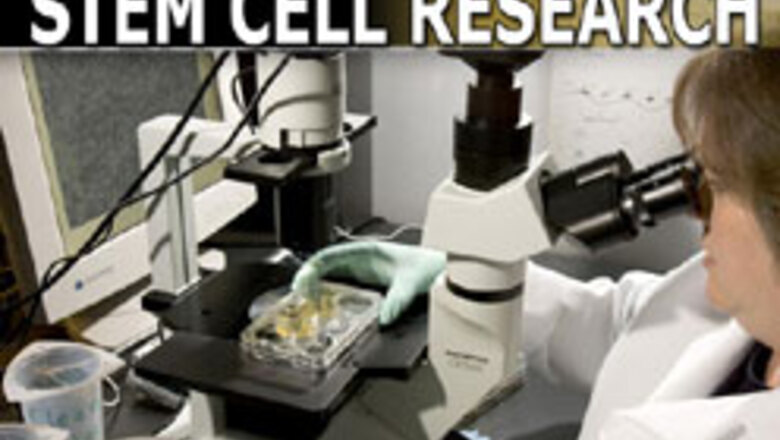
views
Washington: Pleadings from celebrities, a former first lady and fellow Republicans did not move President Bush from his determination to reject, with the first veto of his presidency, a bill expanding federally funded embryonic stem cell research.
Nor was Bush swayed by two days of emotional debate in Congress, punctuated by stories of personal and family suffering, that plunked lawmakers into the intersection of politics, morality and science.
"The President believes strongly that for the purpose of research, it's inappropriate for the federal government to finance something that many people consider murder. He's one of them," spokesman Tony Snow said.
Strong majorities in the House and Senate joined sentiments with most Americans and passed a bill that lifts restriction currently limiting federally funded research to stem cell lines created before August 9, 2001.
But neither the House nor the Senate mustered the two-thirds vote necessary to beat a determined President, although lawmakers planned to try almost as soon as the President vetoes the bill. That veto was expected as early as Wednesday.
"I expect that the House will sustain the President's veto," said House Majority Leader John Boehner.
Disappointed lawmakers said they intended to keep pushing to lift the restrictions.
"The unfortunate part is, if the President does veto the bill, then it sets us back a year or so until we can finally pass a bill that will have the requisite supermajority to be able to become law," said Senator Orrin Hatch. "And that sets back embryonic stem cell research another year or so."
The Senate voted 63-37 on Tuesday, four votes short of the two-thirds majority that would be needed to override a veto. The House last year fell 50 votes short of a veto-proof margin when it passed the same bill, 238-194.
Senate Majority Leader Bill Frist, a surgeon who pushed for expanding federal funding for embryonic stem cell research, said Bush in private conversation vowed not to let any more embryos be destroyed for research with federal money on his watch.
Bush has made 141 veto threats during his time in office, and the Republicans controlling Congress typically respond by changing bills to his liking.
Bush's stand against stem cells is popular among conservative Republicans that the party will rely on in the congressional elections this fall.
Those opponents are the same voters who have felt alienated by Bush's actions to increase legal immigration, and the veto could bring them back into the fold.
One conservative group, Focus on the Family Action, in Colorado Springs, praised Bush's uncommon character and courage in his defense of unborn, while blasting senators who voted against Bush.
PAGE_BREAK
"Some members of the Senate who should know better voted to destroy human lives - and that goes beyond cowardice."
Although many in the religious right are passionately opposed to stem cell research, most Americans support it, and Bush risks alienating that majority in the critical midterm year.
Democrats said two other bills under debate on Tuesday were designed to appease voters angry that the GOP-led government had not opened more doors to research.
"Their opposition to stem cell research is outside the American mainstream, so they want to give themselves political cover by voting for two meaningless bills," said Senate Democratic leader Harry Reid. "It's a playbook straight from the Republican Orwellian world of politics."
One bill, which passed the Senate but failed in the House, would encourage stem cell research using cells from sources other than embryos in an effort to cure diseases and treat injuries.
The other, passed unanimously in the House and Senate, would preemptively ban "fetal farming," the growing and aborting of fetuses for research.
Most disagreement revolved around expanding the embryonic stem cell lines available for federally funded research, which many scientists say hold the promise of treating chronic and degenerative disease.
Bush on August 9, 2001, signed an executive order restricting government funding to research using only the embryonic stem cell lines then in existence, groups of stem cells kept alive and propagating in lab dishes.
Opponents said that the bill lifting that restriction also puts strong ethical guidelines in place, requiring donors to give their informed consent for using embryos that would otherwise be discarded.
"Those lives will not begin, but many other lives will end if we do not use all the scientific resources available," said Senator. Arlen Specter.
Its opponents, including the President, said no conditions would make it ethically appropriate for embryos to be used in scientific research.




















Comments
0 comment